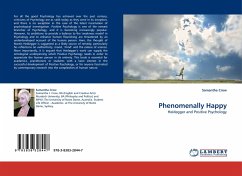For all the good Psychology has achieved over the past century, criticisms of Psychology are as valid today as they were in its inception, and there is no exception in the case of the latest incarnation of psychological investigation. Positive Psychology is one of the newest branches of Psychology, and it is becoming increasingly popular. However, its ambitions to provide a balance to the 'weakness model' in Psychology and to enhance human flourishing are threatened by an underdeveloped account of the human person. Here, the thought of Martin Heidegger is suggested as a likely source of remedy; particularly his reflections on authenticity, mood, 'mind' and the nature of science. More importantly, it is argued that Heidegger's work can supply the ontological underpinning which Positive Psychology needs in order to appreciate the human person in its entirety. This book is essential for academics, practitioners or students with a keen interest in the successful development of Positive Psychology, or for anyone fascinated by contemporary research into the complexities of human nature.
Bitte wählen Sie Ihr Anliegen aus.
Rechnungen
Retourenschein anfordern
Bestellstatus
Storno








